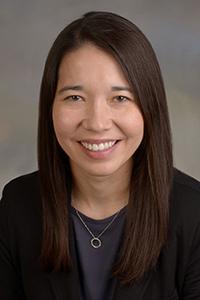Glaucoma Fellowship
About the Program
![]() The glaucoma fellowship is a one-year program beginning on July 1 of each year. We emphasize both clinical and research training in this fellowship. An additional year of basic research fellowship may be arranged. Our glaucoma fellowship is AUPO FCC approved.
The glaucoma fellowship is a one-year program beginning on July 1 of each year. We emphasize both clinical and research training in this fellowship. An additional year of basic research fellowship may be arranged. Our glaucoma fellowship is AUPO FCC approved.
The University of Iowa Glaucoma Center has a passion for eradicating needless blindness due to glaucoma. The war on glaucoma blindness takes place on three fronts: clinical care, teaching, and research. The University of Iowa is at the forefront in all three of these arenas:
- Providing the highest quality patient care with the latest technology
- Educating clinicians, researchers, students, and patients
- Researching the causes of glaucoma and developing tools to aid in diagnosis and treatment
The clinical experience provides extensive training in the diagnosis and treatment of glaucoma. We are the major glaucoma referral center for Iowa and western Illinois, an area with a patient population of about three million. Most of our patients have fairly advanced glaucoma and will provide the opportunity for the fellow to acquire skills in gonioscopy, disc evaluation, and visual field interpretation. The laser and surgical experience is comprehensive and includes trabeculectomy; glaucoma drainage devices (Baerveldt and Ahmed implants); minimally invasive glaucoma surgeries (GATT, KDB, ABiC, iStent), and infantile glaucoma surgery.
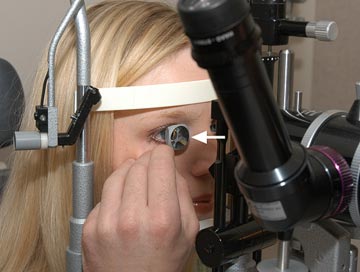 Patient Care
Patient Care
Our fellowship training combines clinical and surgical experience. As the largest tertiary care center in Iowa, we receive referrals from across Iowa and the surrounding states. Fellows study directly with leading experts and experience a wide spectrum of cases, from the very simple to the most complex.
Education
The Department of Ophthalmology at the University of Iowa has a unique, superlative teaching program. Morning rounds are held Monday through Thursday from 8:00 to 8:45 a.m. These are attended by all faculty, fellows, and residents and consist of patient presentations, seminars, and interesting discussions. Every Friday morning during the academic year, faculty members present a two-hour lecture covering sections of the Basic and Clinical Sciences course subject material. Additionally, the Glaucoma Service has chart rounds at the end of every clinic, where complex cases of the day are discussed.
Faculty are always available to provide guidance, mentorship, and research assistance. However, glaucoma fellows enjoy a balance of supervision and autonomy to work independently.
Our fellows also become very involved in the training of our residents and medical students both on a one-to-one basis in the clinic, as well as in morning rounds.
Research
Each glaucoma fellow will design, execute, and complete a research project. Fellows select a faculty mentor who will provide guidance and assistance with the project. Research is presented at the annual Residents' and Fellows' Day in the Spring. Fellows are encouraged to publish and present their research at regional and national meetings.
There are also many opportunities to participate in ongoing research projects of the glaucoma faculty. Research interests in the Glaucoma Service include the molecular genetics of glaucoma, glaucoma cell biology, pediatric glaucomas, glaucoma education, visual field testing, and ocular imaging.
Research Training
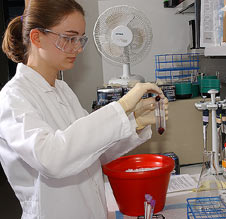 Each ophthalmology fellow is expected to complete a research project based on clinical or laboratory experience. Research is usually performed within the department, but can take place in another department or, occasionally, at another institution. The research interests of the faculty are varied, and many projects are in progress. Presentations of research are made annually during the Resident/Fellow Research Conference at the end of the academic year. The P.J. Leinfelder Award is given annually by a faculty committee to the fellow who has made the most significant contributions in preparing and delivering their research.
Each ophthalmology fellow is expected to complete a research project based on clinical or laboratory experience. Research is usually performed within the department, but can take place in another department or, occasionally, at another institution. The research interests of the faculty are varied, and many projects are in progress. Presentations of research are made annually during the Resident/Fellow Research Conference at the end of the academic year. The P.J. Leinfelder Award is given annually by a faculty committee to the fellow who has made the most significant contributions in preparing and delivering their research.
- Visit our most recent Resident/Fellow Research Day program for examples of typical areas of research interest.
- About our Lab Facilities
- Faculty Research Interests
- About the Institute for Vision Research
Rounds, Lectures, and Conferences
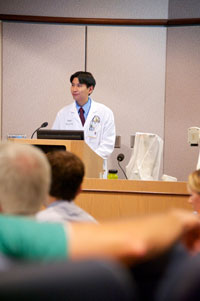 Grand rounds are held Monday through Thursday from 8:00 to 8:45 a.m. in the Braley Auditorium. All residents and staff attend unless operating or engaged in acute medical care. During rounds, residents and fellows develop their public speaking skills by making presentations. Discussion by the faculty and house staff follows each case.
Grand rounds are held Monday through Thursday from 8:00 to 8:45 a.m. in the Braley Auditorium. All residents and staff attend unless operating or engaged in acute medical care. During rounds, residents and fellows develop their public speaking skills by making presentations. Discussion by the faculty and house staff follows each case.
The cases and discussions presented by Residents and Fellows at Grand Rounds are often further developed and published as case reports and tutorials on EyeRounds.org.
Afternoons are, in general, reserved for rotation-specific conferences. Some services such as glaucoma, cornea, neuro-ophthalmology, and pediatric ophthalmology have "chart rounds". These conferences focus on interesting patients that presented that day. Discussions center on patient care but also cover other areas such as communication, ethics, and systems based care. Other services such as retina have formal conferences, such as Fluorescein conference on Monday afternoons, and Dr. Ed Stone's molecular ophthalmology rounds on Tuesday nights.
Once a week during the academic year, didactic lectures on ophthalmology are presented. These two-hour lectures are organized to coincide with the American Academy of Ophthalmology’s Basic and Clinical Sciences Course. Lectures cover most aspects of basic and clinical ophthalmology. Once every 10 weeks these sessions include a journal club covering recent journal articles in that subject area to help develop skills in practice based learning.
Six, day-long clinical conferences are held during the academic year. Clinics are closed on these days. Ophthalmologists from throughout Iowa and Illinois attend and present challenging clinical problems for discussion by faculty and guests. These meetings feature a visiting professor who presents a lecture based on his/ her research interests. The day is balanced by the presentation of a more clinically oriented topic. This conference has contributed to the excellent rapport between practicing ophthalmologists and the ophthalmology staff at the university.
Each year in June, alumni and other members attend a two- to three-day Iowa Eye Association meeting with invited speakers and a focus on a specific subspecialty topic.
Presentations of research are made annually during the Resident/Fellow Research Conference at the end of the academic year.
Quick Fellowship Facts
By the Numbers
Number of glaucoma fellows accepted each year: 1
Length of Fellowship: 1 year
Faculty Members who train Glaucoma fellows: 4
Benefits
Comprehensive medical, dental, hospitalization and pharmacy benefits for residents/fellows and their dependents
Vacation each year: 3 weeks, for specific information Paid Time Off and Leave Information
Board Certification Requirements
Glaucoma is not a Board Certified subspecialty, However, Ophthalmology is Board Certified. Visit the American Board of Ophthalmology for specifics on board certification requirements
How to Apply
The Glaucoma fellowship is a one year program beginning each year on July 1 and ending June 30 of the following year. Only CAS Applications through the SF Match are accepted. Register with and apply through the Central Application Service of the Ophthalmology Matching Program:
Ophthalmology Matching ProgramP.O. Box 7584
San Francisco, CA 94120-7584
Phone: 415-447-0350
FAX: 415-561-8535
Web Site: http://www.sfmatch.org
In addition to the CAS application, the following support information with name, address, email, phone number and SF Match registration number, should be sent to us directly via email, glaucoma@uiowa.edu:
- Recent Digital Photograph
- Copy of Green Card, if you are a holder of a permanent visa.
- Desired fellowship period (inclusive dates)
- Valid state medical license number and expiration date, if any.
- Information regarding any private practice experience, if any.
- Military Service information (if any) including, active duty service branch, dates of service, highest rank attained, reserve commission.
Normally, applications are accepted until October 1 each year.
Deadlines
Normally, applications are accepted until October 1 each year.
Fellowships usually start on July 1 and end on June 30 of the following year.
Only CAS Applications through the SF Match are accepted.
Orientation for new fellows begins July 1, so you must be available for that start date and be licensed in Iowa by June 30.
The Interview
This year due to COVID-19 safety concerns, we will be conducting virtual interviews and using the University of Iowa’s ZOOM video account. A few weeks before your interview we will email instructions about how to use ZOOM software and about your your interview itinerary. You are welcome to contact us by email or telephone if you have specific questions.
Criteria
The University of Iowa endeavors to attract the highest caliber and most suitable applicants to become ophthalmology fellows.
Glaucoma fellows must have successfully completed an Accredited Ophthalmology Residency by the start of the fellowship (July 1).
We place a high emphasis on providing sub-specialty training for clinical ophthalmology and research. Letters of recommendation, performance on OKAP and other national examinations, extracurricular activities and the applicant's personal statement are criteria that are considered prior to offering applicants an interview.
Our People
The Glaucoma Service has four attending physicians at the UIHC:
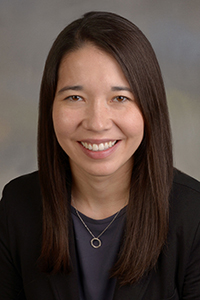
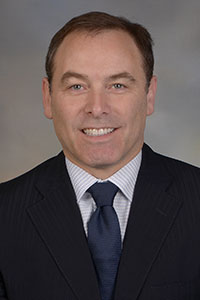
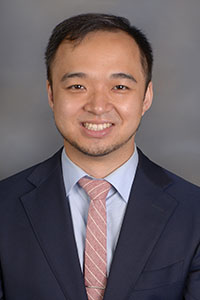
Left to right: Erin A. Boese MD; John H. Fingert MD, PhD; Andrew Pouw MD; Marc Töteberg-Harms,MD, FEBO
Two additional emeritus and part-time faculty participate in fellow education and research training:
- Wallace L.M. Alward MD
- Young H. Kwon MD, PhD
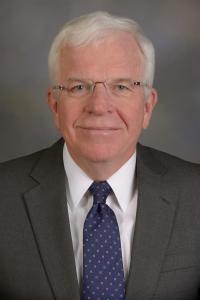
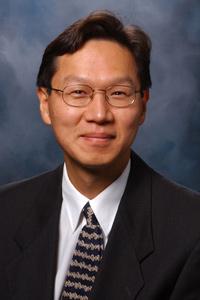
Left to right: Wallace L.M. Alward MD and Young H. Kwon MD, PhD
The three senior members of the faculty (Drs. Alward, Kwon, and Fingert) have been named as Best Doctors®. In 2011 Dr. Alward was recognized by U.S. News & World Report as being among the country's best ophthalmologists.
In addition to the glaucoma fellow, the clinic is staffed by a first- and third-year opthalmology resident. There are three technicians who manage patient flow as well as a full-time clinical research coordinator. There are five dedicated perimetrists trained in both Goldman and automated visual field testing who are shared by all services.
We are also training the next generation of scientists with the skills needed to investigate the causes and potential cures of glaucoma in the research laboratories of the Iowa Glaucoma Center. We have a comprehensive research program that includes stem cell biology, transgenic aninmal models, human molecular genetic studies, pediatric glaucoma research, and high throughput drug testing.
Glaucoma Fellowship Director
Current Fellow
Our Fellow Alumni
Our fellowship is extremely competitive and we are fortunate to have had wonderful fellows over the years. Fellows graduating from the University of Iowa practice in 22 states in the United States and in countries around the world.
Clinical Fellows
- Elisabeth Aponte, MD, Tallahassee, Fla.
- William A. Argus, MD, Fort Wayne, Ind.
- Roger Barth, MD, Kalispell, Mont.
- Pierre Blondeau, MD, Saint-Denis-de-Brompton, Quebec, Canada
- Christina Bruno, MD, Falls Church, Va.
- James Burden, MD, Willford Hall Medical Center, San Antonio
- John Campagna, MD, San Antonio
- Dean Carlson, MD, Colorado Springs, Colo.
- Megan Chambers, MD, Columbus, Ohio
- Jiaxi Ding, MD, Greensboro, N.C.
- John Fingert, MD, PhD, University of Iowa, Iowa City, Iowa
- Austin Fox, MD, University of California Irvine, Gavin Herbert Eye Institute, Irvine, Calif.
- Thomas Graul, MD, Lincoln, Neb.
- Emily Greenlee, MD, University of Iowa, Iowa City, Iowa
- William Haynes, MD, Asheville, N.C.
- Robert Honkanen, MD, Stony Brook University, Stony Brook, N.Y.
- A. Tim Johnson, MD, PhD, University of Iowa, Iowa City, Iowa
- Jason P. Kam, MD, Kaiser Permanente, Seattle
- Cheryl Khanna, MD, Mayo Clinic, Rochester, Minn.
- Michael Krasnow, DO, PhD, Marshall University, Huntington, W.Va.
- Ed Langlow, MD, Mandeville, La.
- John Lee, MD, Decatur, Ill.
- Richard A. Lewis, MD, Sacramento, Calif.
- Reid Longmuir, MD, Nashville, Tenn.
- Michael Maley, MD, Elmwood Park, N.J.
- Christian Mays, MD, Augusta, GA
- J. Kevin McKinney, MD, Oregon City, Ore.
- John H. Mensher, MD, Seattle
- Matthew A. Miller, MD, Colorado Springs, Colo.
- Martin Mizener, MD, Omaha, Neb.
- Michael Motolko, MD, London, Ontario, Canada
- Robert B. Nixon, MD, Rapid City, S.D.
- S. Douglas Owens, MD, Montgomery, Ala.
- Ana Rubin Panvini, MD, Geisinger Medical Center, Danville, Pa.
- Gregory J. Panzo, MD, Mt. Dora, Fla.
- Mansi Parikh, MD, Oregon Health Sciences University, Casey Eye Institute, Portland, Ore.
- Charles D. Phelps, MD, deceased
- Scott Piette, DO, Pottsville, Pa.
- Gary K. Phelps, MD, Southport, Queensland, Australia
- Tyler S. Quist, MD, Colorado Springs, Colo.
- Sean S. Rivera, MD, Albuquerque, NM.
- Lesya Shuba, MD, PhD, Dalhousie University, Halifax, Nova Scotia, Canada
- Robert Smith, MD, Lancaster, Wis.
- Kirk Sturridge, MD, Dothan, Ala.
- Gregpry E. Sutton, MD, Lincoln, Neb.
- Ed Sung, MD, Wheaton, Ill.
- Shandiz Tehrani, MD, PhD, Oregon Health Sciences University, Casey Eye Institute, Portland, Ore.
- Brian Tienor, MD, PhD, Homewood, Ill.
- Yaffa Weaver Brown, MD, Mobile, Ala.
- Mitchell D. Wolfe, MD, Madison, Wis.
- Norman Zabriskie, MD, University of Utah, Salt Lake City
- Ze Zhang, MD, New Orleans
Research Fellows
- Nour Arafat, MD, Amman, Jordan
- Minoru Araki, MD, Tokyo
- Adnan H. Halasa, MD, Amman, Jordan
- Sungpyo Hong, MD, PhD, Daegu, South Korea
- Kazuhide Kawase, MD, Gifu University, Graduate School of Medicine, Gifu, Japan
- ChanYun Kim, MD, PhD, Sodaemun-gu, Seoul, South Korea
- Chang-Sik Kim, MD, Taejon, South Korea
- Young Kim, MD, Pasan, South Korea
- Dertad Manguikian, MD, Fairfax, Va.
- Mary Lucy Pereira, MD, Coral Gables, Fla.
- Samir G. Salamoun, MD, Beirut
Contact Ophthalmology Directors
Glaucoma Fellowship Director
Erin A. Boese, MD
Phone: 1-319-356-3938
Ophthalmology Fellowship Director
Alina Dumitrescu, MD, FACS
University of Iowa Health Care
Ophthalmology and Visual Sciences
200 Hawkins Drive
Iowa City, IA 52242-1091
Email: alina-dumitrescu@uiowa.edu
Ophthalmology Fellowship Coordinator
Vikki Bell
University of Iowa Health Care
Ophthalmology and Visual Sciences
200 Hawkins Drive
Iowa City, IA 52242-1091
Email: vikki-bell@uiowa.edu
Phone: 319-356-0382
